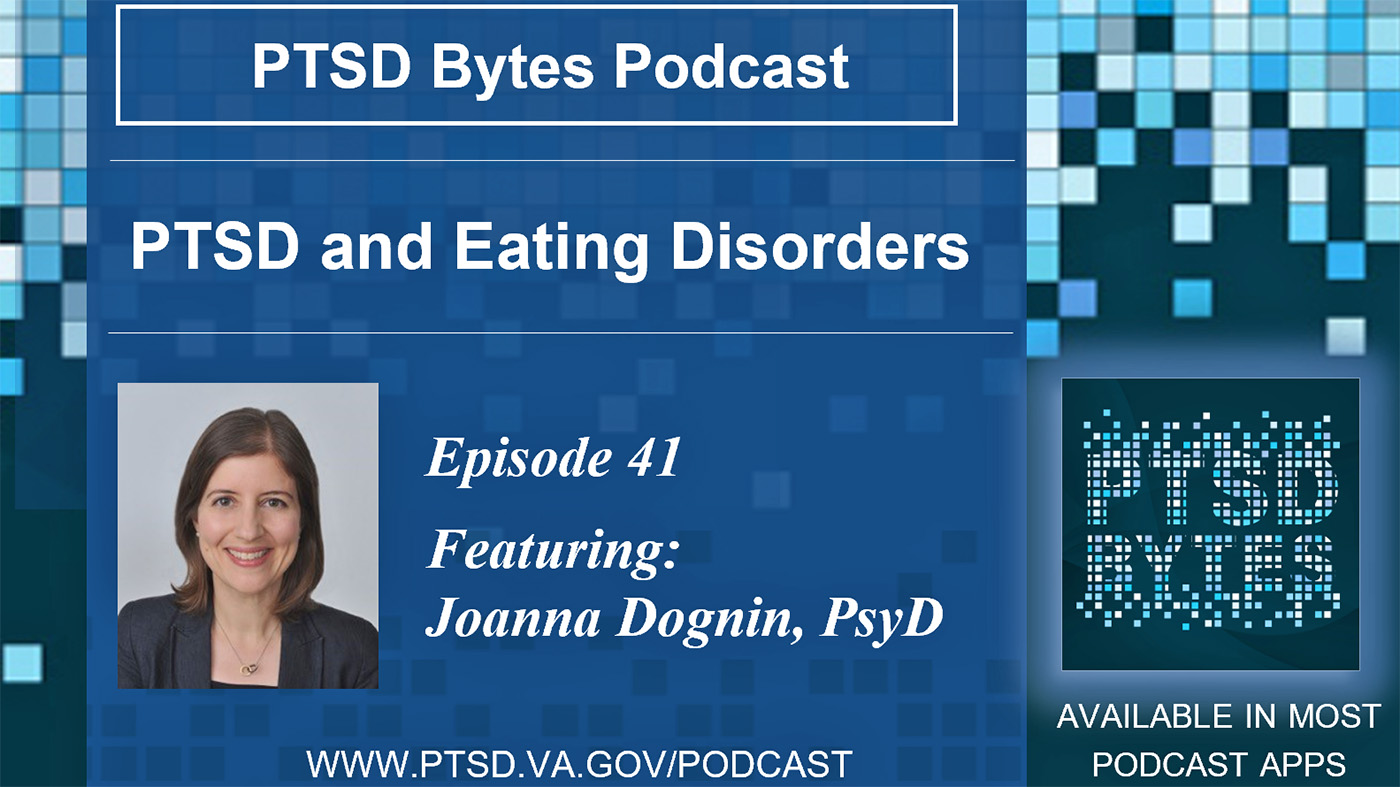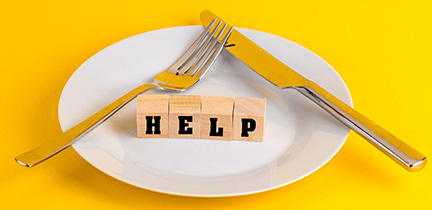In this episode of the PTSD Bytes podcast, host Dr. Colleen Becket-Davenport explores the complex relationship between post-traumatic stress disorder (PTSD) and eating disorders with Dr. Joanna Dognin, member of the National Eating Disorders team for VA’s Office of Mental Health.
What is disordered eating?
According to a VA dietitian, “Eating disorders exist on a spectrum based on the severity and the degree to which it interferes with everyday life. Signs of an eating disorder include an unhealthy relationship with food, body image and/or physical activity.” Disordered eating behaviors can include restricting, binging and purging.
Breaking stereotypes: Eating disorders affect everyone
There is a stereotype that eating disorders primarily affect young, affluent white women. In fact, eating disorders can affect anyone, including all gender identities, body types, races, ethnicities, ages and socioeconomic statuses. It’s important that health care providers and loved ones don’t make assumptions that prevent them from recognizing or asking about eating behaviors in people who don’t fit the stereotype.
Research shows that eating disorders are as common—if not more so—in Veterans and service members compared to the general population. It is difficult to know the accurate numbers because eating disorders are often underreported. The stigma around eating disorders and the fear of negative impacts on a military career may contribute to this underreporting.
Military life can intensify disordered eating patterns. The pressure to meet strict weight standards can lead to behaviors like extreme dieting, purging and binge eating. While on active duty, changes in food availability and the need to eat quickly can also contribute to unhealthy eating habits.
This pattern of binging–restricting–binging can evolve over time into an eating disorder, especially when combined with the stress and trauma often experienced in military service. Veterans who experience food insecurity (not having enough to eat) are also more likely to have disordered eating behaviors
PTSD and eating disorders
There is a strong link between trauma and eating disorders. For some, disordered eating can become a coping mechanism for dealing with PTSD. Behaviors like binge eating or purging can serve to numb painful emotions or distract from traumatic memories.
Changes in body shape and size caused by an eating disorder can be a way for some individuals to regain a sense of control and safety, especially if the PTSD is related to sexual violence.
Treatment options for PTSD and eating disorders
There is no one-size-fits-all model for treating PTSD and eating disorders, so it’s important to seek a tailored treatment approach. Talk to your health care provider for a comprehensive evaluation to understand how your PTSD and eating disorder symptoms may be connected, and the severity of each. For Veterans using VA health services, each VA health care network has an outpatient eating disorder team and a PTSD team that can provide specialized care.
For those receiving care outside the VA system, starting with a primary care doctor for referrals is a good first step. It’s important to connect with providers who have expertise in evidence-based treatments for both PTSD and eating disorders.
Digital resources
Although there aren’t yet specific digital tools for managing both PTSD and eating disorders together, the Recovery Record app is one option. This app helps individuals track their eating habits and emotions, offering therapeutic support and coping strategies.
The VA mobile app PTSD Coach also has coping tools to help manage symptoms. More information about eating disorders and VA resources can be found online at www.womenshealth.va.gov/topics/disordered-eating.asp.
Additional links
- VA articles about eating disorders and VA resources for unhealthy eating patterns.
- Resources for Veterans experiencing food insecurity: VHA Food Security Office.
- Online webinar for health care providers: PTSD and Eating Disorders.
- Learn more about VA mental health apps.
- Find mental health treatment at VA.
- See more PTSD Bytes episodes.
If you are a Veteran who is experiencing a crisis or supporting a loved one who is, call 988 and press 1 for immediate assistance, or chat online at VeteransCrisisLine.net/chat.
Topics in this story
Link Disclaimer
This page includes links to other websites outside our control and jurisdiction. VA is not responsible for the privacy practices or the content of non-VA Web sites. We encourage you to review the privacy policy or terms and conditions of those sites to fully understand what information is collected and how it is used.
More Stories
James A. Haley Veterans’ Hospital (JAHVH) Chief of Innovation Dr. Indra Sandal was awarded the Federal Excellence in Healthcare Management Award as part of the 29th annual Joint Federal Sector Awards.
Having a maternity care coordinator at your side means you’ve got an advocate to ensure you and your baby receive the best care.
From fresh flowers to herbs and even produce, almost any plant can be grown in a container!







I was told 1 year ago that I have PTSD; and that I have been repressing it. I am going to VA counseling for it. But I am having a very difficult time having an appetite. I have to force myself to eat. I have lost 25lbs over the last 4 months. Just from not eating. I try to exercise but have very little energy or motivation. I am going to my doctors and the hospital. It is starting to improve. But it would be nice to have someone to talk to after hours, other than the Suicide Hotline. I was Baker Acted two weeks ago, just because I was talking to someone on the Hotline. I was not suicidal, did not have a plan, nor the intent. I was an LCSW for 28 years in the medical field. I have the ability to Baker Act people on my own. What was done to me was just wrong! We need a Hotline to call when we are having emotional problems which are not suicidal. And no, I am not going to be leading it. :)
Thank you for sharing with us. We’re sorry that you have had these experiences. Unfortunately we’re not able to assist with care, but we do have a couple recommendations for you. First, you can ask your care team for recommendations for other hotlines that may serve you better. Second, you could explore the resources in the VA’s Safety Plan mobile app (more information: https://www.ptsd.va.gov/appvid/mobile/safety_plan_app.asp). Once you download the app, go to “Support” then the “More Resources” tab. Finally, if you feel that your care team is not meeting your needs, you can speak with the patient advocate at your VA Medical Center. They can work to address your concerns by acting as a liaison between you and your care team. Get in touch with them by calling your local VA Medical Center and asking for a patient advocate. Or you can search online using your local VA name and “patient advocate” – the top result should be a website with that person’s name and contact information. We hope this information is helpful.